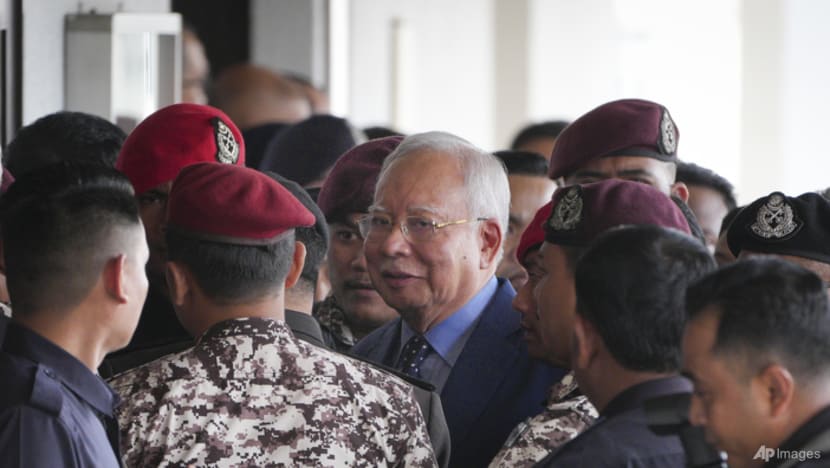Commentary: Najib still wields influence like no other in Malaysia, even behind bars
Without corruption as a cause to unite Prime Minister Anwar Ibrahim’s base, policy reforms will inevitably split Malaysian voters by ideology, says political analyst James Chai.


This audio is generated by an AI tool.
KUALA LUMPUR: Even in his 27th month in Kajang prison, former Malaysian prime minister Najib Razak still wields influence like no other, albeit indirectly.
His public 1MDB apology led to Prime Minister Anwar Ibrahim having to come out and defend himself for welcoming the apology. Najib’s party fights for lighter sentencing and pardoning at every opportunity. More recently, the government’s proposed home detention law was immediately linked by many to Najib’s push for house arrest as a way to serve out his reduced six-year sentence.
Part of this is a function of time – Malaysians still have not found catharsis for the 1MDB corruption scandal even as governance has since significantly improved. Another part is Najib’s unceasing shadow that follows, as his loyalists work hard to maintain his relevance.
Unwittingly or by design, whatever happens to Najib will have a political impact to the Pakatan Harapan (PH) coalition.
PAKATAN HARAPAN’S RELATIONSHIP WITH UMNO
From his sentencing in August 2022 and partial royal pardon in February 2024, to the High Court’s recent decision to proceed with trial on a separate set of 1MDB-related abuse of power and money laundering charges, they either cast a shadow or shine a light on the country’s fight against corruption and, in a larger sense, whether the system still works.
Of course, the other most important political implication is the relationship between PH and Najib’s party, the United Malays National Organisation (UMNO), that is still dominated by his loyalists. UMNO is a critical partner in the unity government for the two-thirds majority stability and Malay-Muslim legitimacy it provides.
A period of coexistence and stability has motivated leaders of both PH and UMNO to think about a potential long-term electoral partnership – a model experimented during the state elections and by-elections to reasonable success, where the unity government group was pitted against opposition coalition Perikatan Nasional.
If left to choice, Najib’s loyalists would prefer that he is released on a full pardon without any more criminal charges or trials to face: Nothing less than an absolute free man. Should this demand be fulfilled, there is a high probability that unity could be secured – enough to even go into the next general election together, if that is a strategy they wish to adopt.
That, however, is politically complicated to Pakatan Harapan, whose support base is ideologically heterogeneous but united on a single cause: Corruption.
In Malaysia, corruption is one of the few causes that is emotive and broad enough to command support across diverse groups, including the younger Gen Z population, despite differences in other beliefs. Pursuing “unity” with UMNO may come at the expense of splitting the PH base.
BREWING SPLIT IN MALAYSIAN VOTERS
There is already an important, but overlooked, ideological split brewing as an unintended consequence of policy reforms. Without the unifying belief that corruption is the primary cause to champion, reforms will inevitably separate PH supporters into ideological camps, as in policy-mature democracies around the world.
The ideological split in economic issues is perhaps the most obvious. As Mr Anwar undertakes large-scale economic reforms relating to fiscal and labour restructuring, by rationalising subsidies (electricity, diesel, and potentially gasoline), introducing new taxes like capital gains tax on unlisted shares, increasing civil servants’ pay and minimum wage, Malaysian voters move to the economic left or right.
The economic left would agree that the rich should pay their fair share, as regressive policies had disproportionately favoured them; while the economic right believes that subsidies is a common right and the government should not penalise the group enlarging the economic pie that also benefits others.
Another ideological divide that is growing from reforms relates to social limits and freedom. The increased regulation and surveillance of restaurants, food establishments, and shops, relating to halal certificates or religious symbols; the stricter guidelines on concerts and entertainment establishments; the Mufti (Federal Territories) Bill 2024 that will strengthen the fatwa institutions, have created social left and rights.
The social left believes in a more secular or less religious manner of organising government and society, whereas the social right believes that religion is intertwined in every aspect, and expansion is always a good to be embraced.
Last, Malaysia is forced to also confront its place in global politics for the first time. Mr Anwar’s stance on the war in Gaza, where he publicly criticised Israel’s actions as the ‘height of barbarism’, has been vocal and consistent, locally or abroad. At the same time, he had also made it known that Malaysia intends to play a key role, especially in blocs of emerging economies and the global south, like BRICS, by meeting with President Vladimir Putin in Russia at the Eastern Economic Forum.
The divide at home is between factions who believe in Malaysia playing an international activist role and another who believes Malaysia should remain passive internationally and focus instead on domestic affairs.
IN AN UNENVIABLE POSITION
These ideological splits are new but they are the underlying complexity that are often missed when we evaluate the current state of Pakatan Harapan supporters. These splits risk diluting Mr Anwar’s mandate to carry out more and deeper reforms, as he increasingly has to rely on the strength of his individual leadership and charisma to build alliances to get difficult decisions through.
But there is one last split, even relating to something as homogenous as corruption, which is the degree of retribution for Najib’s case. What punishment is considered sufficient to be just deserts for the crime of 1MDB? Could we allow for lighter sentencing or pardoning, even partial? Should we accept his apology if made publicly and openly, though not completely? Should we allow for house arrest towards the end of his sentence?
None of these questions has obvious answers or positions. The government is put in an unenviable position, of needing to push through tough reforms that would inevitably upset some, working with partners of opposing interests, and a former prime minister whose fate still affects the government, not even halfway through his jail term.
James Chai is a political analyst, columnist and the author of Sang Kancil (Penguin Random House).













